Welcome
to Johnbirchall-economist.com!
(Interaction and
PANeL News)
European
News
Romania
moves towards EU membership
One of the two countries expected to
join the EU in 2007 has moved to end speculation in its currency and in
doing so is attempting to prepare another part of its financial sector
ready for eventual membership of the Euro. Romania recently announced that
it was trying to stop speculative flows of money entering the country. The
recent inflows have put pressure on authorities to raise interest rates
but they fear that this will attract ‘hot money’. So, they are
allowing some extra liquidity to remain in the economy and so reduce the
speculators taking a gamble that as membership of the EU draws nearer so
returns in Romania will increase. Officials of the Central Bank fear that
too much money is entering the country in search of short-term profits and
that this will destabilise the financial sector.
This deliberate strategy to keep hot
money out is an attempt to stop interest rates from rising and so making
eventual membership of the Euro a reality...
Some
sites that might be of use in any study you may make of the economy of
Romania.
http://www.aboutromania.com/economy.html
http://www.einnews.com/romania/newsfeed-RomaniaEconomy
http://www.investromania.ro/economyfocus.htm
http://tpb.traderom.ro/En/Cd/Rom_prez_ec/economy.htm
For daily news on Romania in English why
not log onto www.daily-news.ro and
read the Bucharest Daily News.
INFORMATION
Each
week we will look at some useful web sites to visit for those studying The
European Union.
This
week we offer some suggestions on the Czech Republic.
Websites
worth visiting
http://news.bbc.co.uk/1/hi/world/europe/country_profiles/1108489.stm
This
is the excellent BBC country profile that includes links to the main
national news papers and radio stations in the Czech Republic and other
relevant sources.
http://www.vlada.cz/1250/eng/aktuality.htm
The
official site of the Czech government site.
http://www.praguepost.com/
An
English language newspaper published in Prague.
http://www.investni.com/czech_republic.pdf#search='economy%20of%20czech%20republic'
A
PDF presentation on why invest in Czech Republic.
http://www.indexmundi.com/czech_republic/economy_overview.html
A
site that will allow you to have considerable access to economic data
World
News
Cell
phones in Africa
For the first twenty years of their
marriage if Skhanhane wanted to contact her husband it meant a potential
walk of over 300 miles. Today she pulls out her cell phone and calls him.
People like Skhanhane have made Africa the fast growing market for cell
phones in the world. From 1999 to 2004 the number of mobile phone
subscribers in Africa jumped from 7.5 million to 76.8 million an annual
average increase of 58%. The next fastest growing market was Asia, which
recorded an annual increase of 34% during the same period. Buying her air
time is now part of her grocery budget, even though she still washes the
clothes of her three children in a bucket. This huge increase comes
against the historical fact that Africans have never been big phones users
(Mongolians until recently used the phone more) and the simple truth that
the majority of Africans live on less than $2 a day. They are supposed to
be too poor to generate the business necessary for companies to invest in
the infrastructure needed for a cell phone network. But when African nations began to privatise their telephone
monopolies in the mid-1990’s it led to an influx of operators selling
air time in smaller units and the ‘lift-off’ took place. Hand set are
not cheap and average $50 per set but even the poorest members of the
continent’s population are beginning to buy phones. One in eleven
Africans now won a cell phone. Some Africa watchers see cell phones have
as big an impact on the continent as television did in the US in the
1940’s. Suddenly remote villages can contact one another and receive
news from around the country and across the world. With one land line per
thirty three people the cell phone in jumping over both conventional
telephone usage and the art of writing a letter – which again offers
opportunity to those who did not attend school and never saw themselves
owning a ‘conventional’ phone.
Healthcare workers are seeing mothers
present themselves for assistance before their unborn child experiences
difficulties, elderly relatives are being communicated with and are
allowed to feel part of their children’s lives and commercial
information is being transmitted around countries. The latter means that
products can be shifted to areas where supply is low and even perishable
items can now experience a slightly scaled down version of ‘just in
time’ delivery. So, as masts appear in some very remote areas of such
countries as the Congo trade, education, health and simple ‘family
affairs’ are feeling the positive impact of something that many thought
would take decades to reach developing countries.
The
international economy – some useful trends and data
Poor
Countries and Trade
At the Gleneagles Summit of the G8 (held
in Scotland in July 2005) the world’s largest economies discussed some
very important topics concerning developing economies. This week we look
at trade and the problems the poorest nations in the world face.
The following charts and tables offer a
useful resource for showing how trade moves between developed and
developing economies. They may also assist you in provoking discussions
within groups.
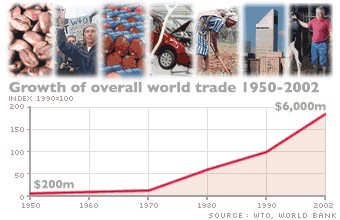
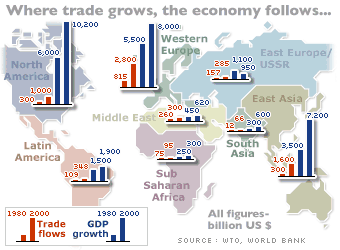
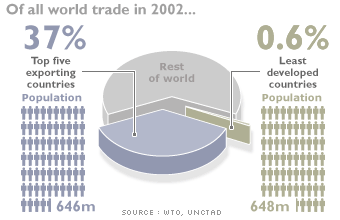
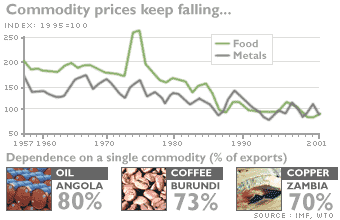
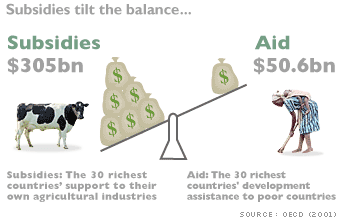
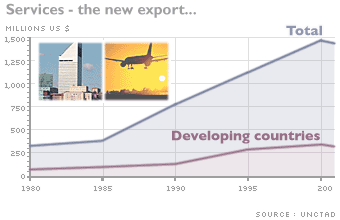
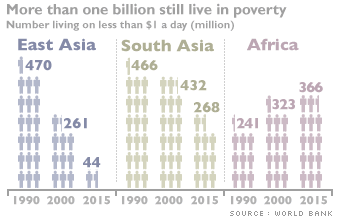
The
major trade blocks of the world.
NAFTA
The United States has linked
with Canada and Mexico to form a free trade zone, the North American Free
Trade Agreement (NAFTA). The NAFTA agreement covers environmental and
labour issues as well as trade and investment, but US unions and
environmental groups argue that the safeguards are too weak. The USA hopes
to expand the area to the rest of Latin America creating a Free Trade Area
of the Americas (FTAA) by 2005, but key countries like Brazil are
sceptical of its benefits. The US is separately signing free trade
agreements with Chile and the five Central American countries of Honduras,
Nicaragua, El Salvador, Panama, and Costa Rica. Meanwhile, the regional
free trade pact called Mercosur, between Brazil, Argentina, Uruguay, and
Paraguay, has been put under severe strain because of currency devaluation
first by Brazil, then by Argentina
CAIRNS
GROUP
Cairns group of agricultural
exporting nations was formed in 1986 to lobby at the last round of world
trade talks in order to free up trade in agricultural products. It is
named after the town in Australia where the first meeting took place.
Highly efficient agricultural producers, including those in both developed
and developing countries, want to ensure that their products are not
excluded from markets in Europe and Asia. Canada, Brazil and Argentina are
other leading members. Recently key developing country members like
Brazil, India and China appear to be working towards forming a separate
negotiating group.
APEC
The Asia-Pacific Economic
Cooperation forum is a loose grouping of the countries bordering the
Pacific Ocean who have pledged to facilitate free trade. Its 21 members
range from China and Russia to the United States, Japan and Australia, and
account for 45% of world trade. Progress on free trade initiatives was
seriously dented by the 1997-98 Asian Crisis, which hurt the economies of
the fast-growing newly industrialised countries like South Korea and
Indonesia. The SARS epidemic of 2003 also dented growth though recent data
suggests that this blip has now passed. But recently China suggested it
would be interested in establishing a free-trade zone with the growing
economies of South-east Asia.